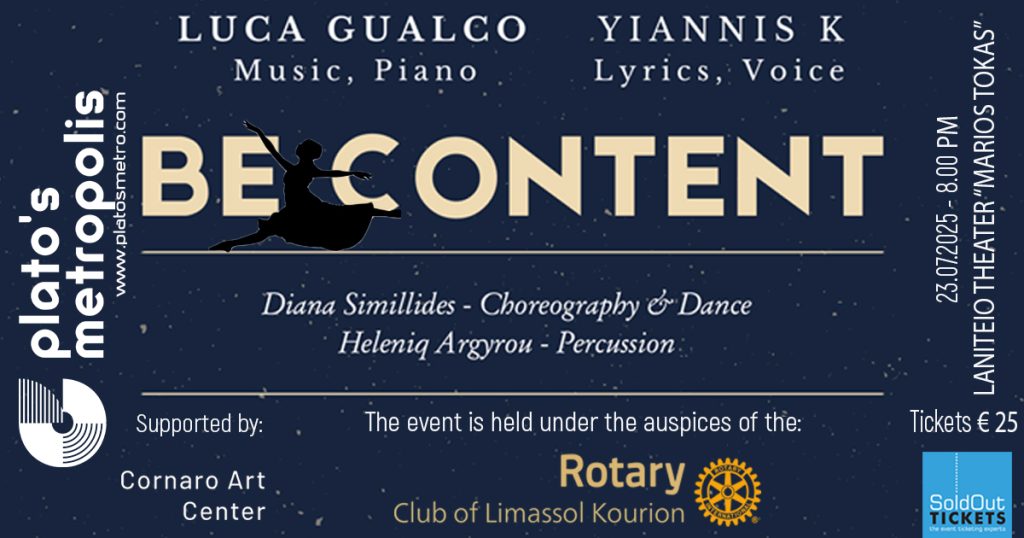Plato’s Metropolis offers a place of meeting and spiritual growth, where people can connect with each other, encourage creativity, enjoy culture, and enhance their emotional and spiritual well-being.
Plato’s refers to the usefulness of Plato’s logic (and not only) for search and creative dialogue, on any subject. There, the different opinions are presented with their advantages and disadvantages and useful conclusions are drawn. The use of Plato in the name does not aim to justify any dogmas resulting from subjective Plato interpretations, deriving from any political ideology or religion that tries to appropriate him. The goal is, as such, the thinking workshop created to promote social progress and art. Metropolis arises in this sense, of a “hotbed” of thought.
Through this rationale, we shoul approach Plato’s work. We do not need to dogmatize any conclusions either from Plato’s Republic or from the Symposium (which deals with the subject of Love) but to draw the gems from the dialogues. Thus, we will be able to more easily capture new ideas and deepen the dialogue to advance our contribution to society and art.
Plato is considered by many intellectuals and not only, the father of philosophy and the foundation on which Western civilization was built. We understand the above fact, which starts from Plato’s original goal in the State, to try to define the concept of justice. But this does not negate the fact that what he proposes is a rather utopian socio-political system (Gallipoli) which has been interpreted in the past by supporters of Stalin, Hitler and several others as they pleased. Perhaps this is also due to the fact that Plato in his attempt to ensure the “ideal” justice reached his own extremes.
The four types of government, according to Plato, which cannot survive, are the following:
Timocracy
Timocracy is defined as a polity ruled by people who love honor which is often equated with wealth and property, so this “golden” polity would lead to materialism.
Oligarchy
Socrates points out that wealth will not help the captain control his ship. This injustice separates the rich from the poor, thus creating an environment for criminals and beggars. The rich are constantly conspiring against the poor and vice versa.
Democracy
The poor overthrow the inexperienced oligarchs and soon grant freedoms to all citizens. Some demagogue soon rises to “protect” the right of the lower classes.
Tyranny (Despotism)
The liberties granted to citizens in democracy divide them into three socio-economic classes: the ruling class, the capitalists, and ordinary citizens, who see their liberties threatened by the tension between the first two classes and resort to the democratic demagogue, who, in turn, is corrupted by power and becomes a tyrant.
The irony lies in the fact that the Ideal State described by Plato is very similar to tyranny, but tyranny in classical antiquity did not have the meaning it has today: the philosopher-king in power does not act in self-interest, but is devoted to the common good, as he possesses knowledge and wisdom.
In most systems, assumptions can be made which, if valid, make them functional and fair, to a large extent. In the absence of these assumptions all systems are, more or less, ill, including Gallipoli. Also, in relation to Plato’s proposal, we must not forget the era he lived in, the decline of the Athenian democratic society that he experienced as well as the presence of the many city-states in ancient Greece.
In addition to the above, there is also, according to Plato, the necessary “brave lie” for social cohesion. This is, that when god created the rulers he made them of gold, the assistants of silver and the creators of iron and copper. And this, without excluding transfers since this utopian State is based on spiritual aristocracy. Aristotle criticized this theory, considering for his part, that it will cause rebellions and does not contribute to the unity of the city. Somewhere in there, is perhaps the biggest weakness of Gallipoli.
Plato argued that “when philosophers reign and kings philosophize, only then will the people be happy”. Of course, this does not only apply to kings but also to the leaders of most states in general.
Good intentions are not guaranteed, de facto, unfortunately, with any polity and dogma, neither socially nor in culture in general. The search for improving culture, art and prosperity continues…
This quest can further progress through various endeavors, such as the development of literacy and intellectual awareness, the promotion of dialectical thinking and critical discourse, and the promotion of cooperation and solidarity. Through these efforts, we can encourage the development of a society that is sensitive to people’s needs, promotes art, and enhances the well-being and spiritual euphoria of individuals.
Despite the challenges we face, the constant pursuit of improvement in the fields of culture, art and well-being is important to advance human experience and create better conditions for all.
Philosophy, is the highest form of music – Plato






